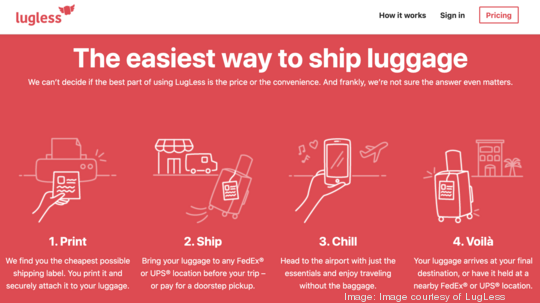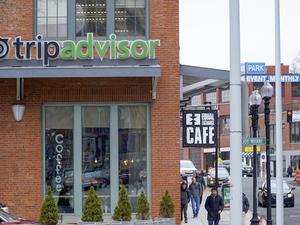
In 2013, LugLess set out to be a cheap way for travelers to have their luggage shipped to hotels and other destinations while cutting down on the amount of time spent at airports.
The same could be said for the company seven years later. The difference today is how the company brands itself as a safe way to travel.
Like many businesses, LugLess had to restrategize once the coronavirus pandemic hit hard. The Boston-based company, which had been on a fast-paced path of success over the years, wondered if it could flourish in a world where it seemed like less people were traveling.
LugLess made less of a pivot than it did a rebrand. The startup positioned itself as a safe way to avoid points of contact during a pandemic, particularly at the airport. Now, the company is experiencing exponential growth and rebounding faster than airlines are, LugLess President Aaron Kirley told BostInno.
“This business that we built around being cheaper and easier than checking really ended up adding safety to travel once it started coming back,” said Kirley, a founder of Luggage Forward, which acquired the company in 2014.
Here's how LugLess works: Each user can go online and set a destination for their luggage. Prices are typically around $40 or less for a 50 pound bag but could vary based on travel distance. The user then prints out a label, places it on their luggage and drops it off at the closest UPS- or FedEx-staffed drop-off location.
In addition to changing the language in its advertising, the company was also able to attract new users who found they actually had more time to travel—one of the few luxuries remote work allows. Extended stays while working outside of the home require more luggage than normal. It's too much to fit in the car but too much of an expense to check at the airport. That's where LugLess comes in, Kirley said.
“People who are traveling are really looking for a contactless travel experience," Kirley said. "They don't want to touch the kiosk at the check-in line or congregate at the baggage carousel. And because everyone is working remotely… we’ve seen a lot of people using us to ship stuff to their longer extended vacations.”
Plus, with travel restrictions loosening during warmer months, people naturally began to plan trips away from home. Kirley said the company is making more deliveries to residences now, which leads to him to believe that those are homestays through companies such as Airbnb and Vrbo. LugLess has also tapped into a new user base in parents of college students, with users shipping luggage to schools as students forget things they may need for the fall semester.
Safety concerns played a key role in LugLess's new messaging. Over the spring and summer, Kirley said he noticed that more searches for safety were leading people to the LugLess website. The rebrand became the focus, and the startup's online advertising reflected a change in travel behaviors and concerns.
“We just knew that people were going to be hesitant to fly, and if people weren't flying, they're probably not shipping their luggage," Kirley said. "Instead of saying, ‘Cheaper than checking’ we maybe said, ‘A safer way through the airport,’ or something like that, and we really just focused on safety in a lot of our messaging... We didn't really have to change anything about how the business was set up to do that, we just had to sort of position it differently for people.”
But before that pivot, things were looking rather dire for the travel startup. Back in March, when the coronavirus pandemic began to take hold in the U.S., the travel industry was probably the first sector to be hit hard: The U.S. Travel Association projected that total spending on travel in the U.S., including transportation, lodging, retail, attractions and restaurants, would plunge by $355 billion for the year, and 4.6 million American jobs would be lost. Boston-area travel companies Lola.com, Hopper, TripAdvisor and Wanderu all made cuts to their teams.
For its part, LugLess hunkered down when airports did and relied on a work-from-home model for the time being. Air travel was down, and with it, Transportation Security Administration Screenings. LugLess thought it might have some trouble on its hands with its business model, even coming on the heels of a banner year.
“In 2019, we were doing about triple digit growth year over year," Kirley said, adding that 2019 also saw a major increase in shipping to hotels. "2020 was on the same trajectory until about March when the pandemic hit and our business kind of fell off the cliff."
Kirley said the coronavirus has made the company realize the additional value it already had that could be played up more. LugLess has now expanded its value proposition.
Kirley predicts more customer interest as pent-up demand for travel continues and airlines try to recoup revenue by upping already expensive baggage fees.
“Once people feel safe to travel again post pandemic, I think that travel’s going to come back stronger than ever before," Kirley said. "And I think that all of these things—all this tech-enabled contactless travel—is here to stay."
Jordan Frias is a contributing writer for BostInno.






